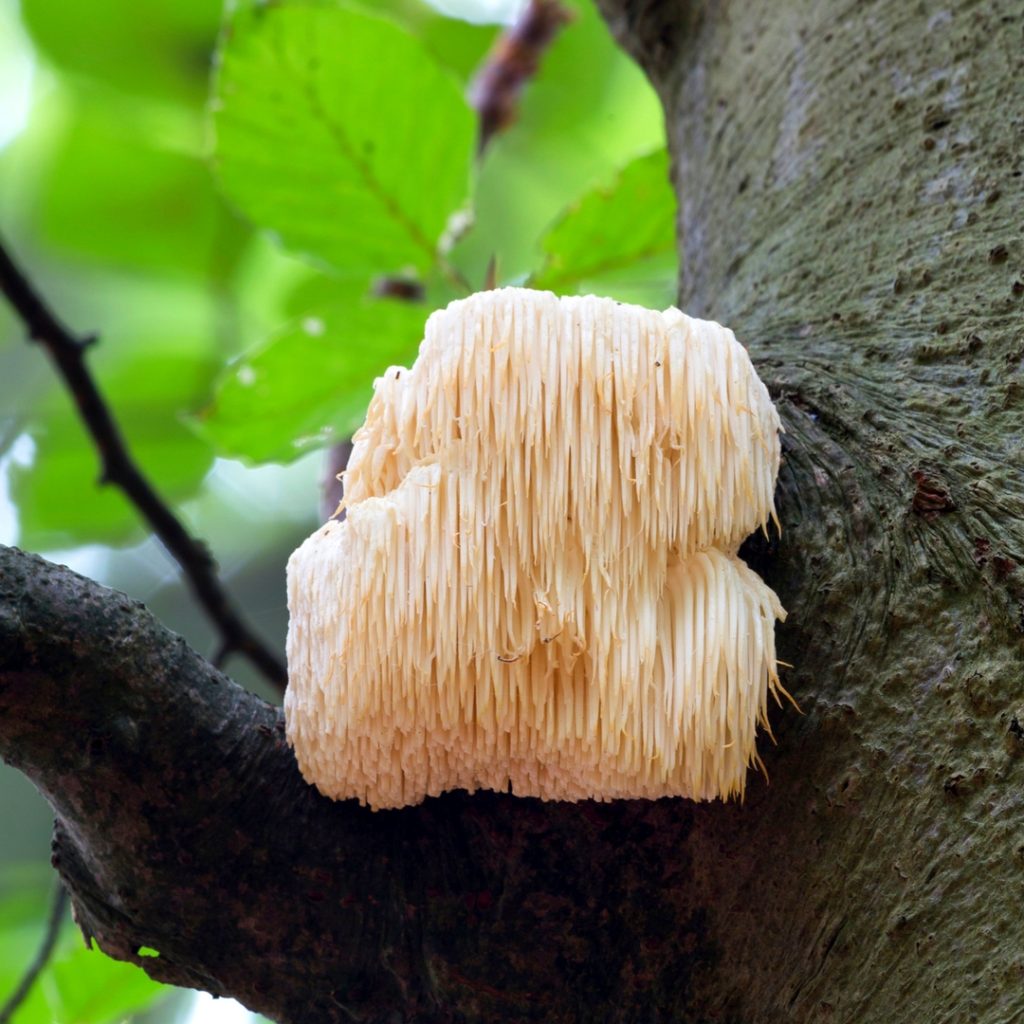When you hear the name “lion’s mane,” the thought of a mushroom probably doesn’t come to mind. Rather than resembling the capped mushrooms that many in western cultures are used to, this potent, medicinal mushroom has long, flowing strands that give it the appearance of a beard or sea anemone. For this reason, it’s been given many names based on its appearance.
Known as “bearded tooth” mushroom, “satyr’s beard,” “bearded hedgehog,” or “pom pom” mushroom, scientifically, this mushroom is known by its Latin name, Hericium erinaceus. Native to the northern hemisphere, specifically Europe, East Asia, and North America, this medicinal fungus grows on cracks in the trunks of beech, oak trees, walnut and apple trees. In traditional Chinese medicine, it has been used for centuries in the treatment of ulcers and gastrointestinal disorders.
As scientists continue to study the additional benefits of this mushroom, they are finding that it may improve brain function, aid the body in fighting cancer, improve cardiovascular function, improve gastrointestinal health, and assist the body in the treatment and management of diabetes.
How does Lion’s mane improve brain function?
As we get older, we may notice that our bodies and brains may not work the way they used to as in our younger days. Without proper nutrition and exercise, our brains are especially susceptible to being negatively impacted in cognitive function. Many of us have experienced a loved one who has dealt with a neurodegenerative disease like Alzheimer’s, Parkinson’s, or dementia. With these diseases, brought on by cellular death in the brain, our loved ones are no longer able to think for themselves as they are incapable of processing new information. One of the great benefits of lion’s mane is its ability to protect the brain from cell death, thereby allowing for the reversal and/or prevention of neurodegenerative diseases.
According to the NCBI, lion’s mane can induce nerve growth factor (NGF) synthesis in nerve cells and promote neurite outgrowth. In several studies, it was found that lion’s mane could promote the regeneration of the peroneal nerve of injured rats in the early stage of brain injury recovery, could induce neuronal differentiation, promote neuronal survival, reduce endoplasmic reticulum stress-induced cell death, and protect cells against neurotoxicity, making it a great candidate for a neuroprotective agent. Several studies published by the NCBI have confirmed that the protective effects of lion’s mane “may serve as a neuroprotective candidate for treating or preventing neurodegenerative diseases.”
For emotional health, there is also some evidence that lion’s mane may serve as a natural treatment for depression and anxiety. A study by the Department of Clinical Psychology at Kyoto Bunkyo University in Kyoto, Japan concluded that “HE intake has the possibility to reduce depression and anxiety.” Further studies have suggested that amycenone (which is obtained from lion’s mane extract) “has antidepressant effects in [sic] LPS (lipopolysaccharide)-induced inflammation model of depression. Therefore, amycenone could represent a potential supplement to prevent inflammation-related depression.”
How does lion’s mane assist the body in fighting cancer?
In an effort to find alternative methods to reverse the growth of cancer cells, medicinal mushrooms continue to prove that they may be the future of cancer treatment. A 2013 publication by the NCBI reported that “Dietary administration of HWE (hot water extract) and MWE (microwaved 50% ethanol/water extract of Hericium erinaceus) reduced the formation of tumor nodules in the lung by about 50% and 55%, respectively, and prevented increases in lung weight caused by cancer cell metastasis.”
Another study looked at various forms of extracts of lion’s mane to determine its ability to induce cell death in human leukemia cells. Findings from this study indicate that the phytochemicals in lion’s mane “may have therapeutic potential against human leukemia.”
Like the chaga and reishi mushroom, lion’s mane is rich in beta-glucan polysaccharides, which provide anti-cancer, immuno-modulating, hypolipidemic, antioxidant and neuroprotective properties. Beta-glucans exhibit anticarcinogenic activity which can prevent oncogenesis. Beta-glucans also have the ability to stimulate the immune system which can help in slowing down or preventing further tumor growth. This process can reduce tumor proliferation and prevent tumor metastasis.
How does lion’s mane improve cardiovascular function?
lion’s mane may be effective in promoting heart health. It has been shown to reduce levels of triglycerides and LDL (“bad” cholesterol) while increasing HDL (“good” cholesterol) levels in the blood.
Elevated triglyceride levels can lead to a condition called hypertriglyceridemia, which can increase the risk of heart disease by 61%. Although elevated triglyceride levels do not cause heart disease on their own, the elevated levels are typically an indication of decreased levels of HDL. On the other hand, elevated levels of LDL are directly responsible for the increased risk of heart disease. With increased LDL in the blood, fat deposits form on the walls of arteries, making it more difficult for blood to pass through. This increases blood pressure and also causes a condition called atherosclerosis. Because lion’s mane has been proven to lower levels of LDL and triglycerides, increasing HDL, the risk of heart disease is reduced.
Additionally, lion’s mane may also assist in the prevention of strokes. According to research by the Department of Cellular Signaling at Tohoku University, lion’s mane mushroom may be able to prevent blood clots which can help to reduce the risk of stroke.
How does lion’s mane aid digestion and improve gastrointestinal health?
Gut health is important in maintaining overall health. Our digestion system gathers nutrients from the foods that we eat and fuels our bodies and our brains. For this reason, we want to ensure that our gastrointestinal health is functioning properly. Studies conducted on the effects of lion’s mane on gastrointestinal health have proven it to be beneficial in protection from damage by increasing the mucus in the gastric mucus barrier.
Also, lion’s mane may protect against gastric ulcers. A study by the Mushroom Research Centre at the University of Malaya in Malaysia found that lion’s mane extract “promoted ulcer protection as ascertained by a significant reduction of the ulcer area.” Furthermore, it has shown a significant protection activity against gastric mucosal injury by “preventing the depletion of antioxidant enzymes.” With this information, it is believed that the bioactive compounds found in lion’s mane may play a significant role in gastroprotective activity.
Moreover, lion’s mane may be beneficial in the treatment of H. pylori, a bacterium that causes stomach inflammation, or gastritis, and can lead to stomach ulcers, and even gastric cancer. According to a study by the Institute of Plant Physiology and Ecology at the Shanghai Institutes for Biological Sciences, “The direct inhibitory effect of EEs (ethanol extracts) and EAFs (ethyl acetate fractions) of H. erinaceus against H. pylori could be another pharmaceutical mechanism of medicinal mushrooms.” In addition to acting as an antibacterial agent, another study published by the Laboratory of Pharmacotherapy of Life-Style Related Diseases of Tohoku University concluded that lion’s mane extract also exhibits anti-inflammatory effects and even “ameliorates adipose tissue inflammation associated with obesity.”
How may lion’s mane assist in the treatment and management of diabetes?
The antioxidant properties of lion’s mane contribute to its ability to control insulin levels. According to a 2013 publication by the Department of Clinical Laboratory at China Medical University, it was found that a direct link exists between oxidative stress and diabetes by noting increased levels in malondialdehyde (MDA), a marker for oxidative stress, in diabetic test subjects that were not treated with lion’s mane extract. Based on this study, an increased level of MDA in the liver “clearly indicates the role of oxidative stress in diabetes, and AEHE (aqueous extract of Hericium erinaceus) might reduce lipid peroxidation by modulating glucose/insulin system. To sum up, AEHE has direct or indirect antidiabetogenic effects by decreasing oxidative stress, and this may be one of the reasons that AEHE improves glycometabolism. Thus, the present investigation showed that AEHE possesses potent antioxidant activity, which may be responsible for its hypoglycemic and hypolipidemic properties.”
Although more human studies are needed to further the research on the benefits of lion’s mane, studies are proving that it may be a powerful agent in promoting health by protecting the brain and the body from various diseases. As with other medicinal mushrooms, lion’s mane can be dried and consumed as a tea or made into a powder which can be added to your smoothies or sprinkled onto your food. Some also prefer to slice it up and either pan-fry, or roast it as a mushroom steak. As a supplement, it can be taken as a capsule, extract or an elixir.
While lion’s mane is considered to be non-toxic with virtually no known side effects, there have been isolated reports of contact dermatitis and respiratory distress related to consuming lion’s mane. Therefore, as with any new dietary addition, it’s best to monitor any potential adverse effects when introducing lion’s mane, or any of new food or supplement into your diet.
Like the chaga and reishi mushrooms, lion’s mane has been used for centuries in Chinese medicine to treat ulcers and other gastrointestinal disorders. By including lion’s mane in your diet, you can help to protect your body against common conditions often due to poor nutritional and lifestyle choices. Improve your health each day by adding a greater diversity of nutrient-dense choices.
Ready to make your health a priority? Contact me here to schedule your consultation.
Sources:
https://draxe.com/lions-mane-mushroom/
https://www.ncbi.nlm.nih.gov/pmc/articles/PMC3924982/
https://www.ncbi.nlm.nih.gov/pmc/articles/PMC3835629/
https://www.ncbi.nlm.nih.gov/pubmed/23510212
https://www.ncbi.nlm.nih.gov/pubmed/24266378
https://www.ncbi.nlm.nih.gov/pubmed/23668749
https://www.ncbi.nlm.nih.gov/pubmed/26559695
https://www.ncbi.nlm.nih.gov/pmc/articles/PMC5133811/
https://www.ncbi.nlm.nih.gov/pubmed/23735479
https://www.ncbi.nlm.nih.gov/pubmed/26853959
https://www.ncbi.nlm.nih.gov/pubmed/21779573
https://www.ncbi.nlm.nih.gov/pubmed/12843656
https://www.dietdoctor.com/triglycerides-and-heart-disease
https://www.ncbi.nlm.nih.gov/pubmed/24302966
https://www.ncbi.nlm.nih.gov/pmc/articles/PMC3852124/
http://www.randwich.es/blog/2015/10/19/pan-fried-lions-mane-mushroom
https://www.ncbi.nlm.nih.gov/pubmed/20834180
https://www.ncbi.nlm.nih.gov/pubmed/26150007
https://www.ncbi.nlm.nih.gov/pubmed/23557368
https://www.ncbi.nlm.nih.gov/pubmed/20637576
https://www.ncbi.nlm.nih.gov/pubmed/24959591
https://www.ncbi.nlm.nih.gov/pmc/articles/PMC4200813/
https://vargagyogygomba.hu/en/articles/lion-s-mane-mushroom-bearded-tooth-fungus
https://www.ncbi.nlm.nih.gov/pmc/articles/PMC5302426/
https://emedicine.medscape.com/article/126568-treatment


The general position of any person is composed from of a large number factors, among which health. Kinds well-being presented complex system, on which not only common mood depend, but also functionality of the organism.
No chance understand and explore state of health, types well-being, and additionally others components of the healthy strong organism, if thoroughly not go into the next position. Thus, the health of a person, to date, is called standard and durable psychosomatic state of the individual.
diabetes type 1 life expectancy
Yes, absolutely. There are a myriad of factors involves in supporting one’s health, which is why it’s so important to continue to be curious and seek out opportunities to learn.